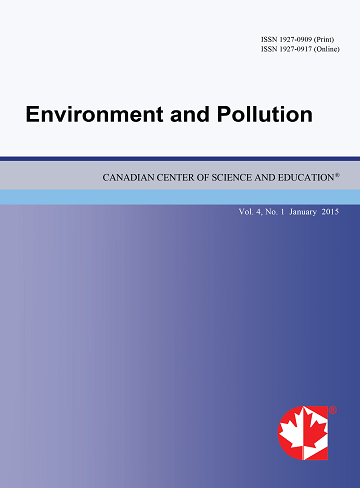Analysis of Coupling the Pesticide Use Reduction with Environmental Policy for Agricultural Sustainability in Taiwan
- Wen-Tien Tsai
Abstract
As Taiwan has a dense population and only limited natural resources, the government began actively establishing a Taiwan’s sustainable development indicators (TSDI) system in 2003 to evaluate the progress towards sustainability. Commonly used pesticides could pose a risk of causing adverse effects to food sanitation, human health and the environment. Thus, the pesticide usage rate per hectare of farmland and the area of organic cultivation have been selected as agricultural sustainability indicators. The objective of this paper was to describe an analysis of current status of pesticide use and regulatory policy for environmental sustainability in Taiwan. Furthermore, it can be connected with the regulatory infrastructure, which has been established by the joint-venture of the central competent authorities (i.e., Council of Agriculture, Environmental Protection Administration, Department of Health, Ministry of Economic Affairs, and Council of Labor Affairs) for controlling and/or preventing pesticide distribution in the environment. The significant progress is that the residual pesticides have notably declined in the past decade, which was in parallel with the pesticide usage rate decreased and organic farming area increased. For example, total area of organically certified cropping in Taiwan has been increased from 900 hectares (ha) in 2001 to about 4,500 ha in 2010. Finally, some recommendations for the pollution prevention and toxicity reduction of pesticide use were also addressed to progress towards a sustainable agriculture in Taiwan.
- Full Text:
 PDF
PDF
- DOI:10.5539/ep.v2n2p59
Journal Metrics
h-index (2017): 10
i10-index (2017): 11
h5-index (2017): 9
h5-median (2017): 15
Index
- Academic Journals Database
- Berkeley Library
- CAB Abstracts
- CAS (American Chemical Society)
- CNKI Scholar
- COPAC
- CrossRef
- DTU Library
- Elektronische Zeitschriftenbibliothek (EZB)
- EuroPub Database
- Excellence in Research for Australia (ERA)
- Genamics JournalSeek
- Google Scholar
- Harvard Library
- Infotrieve
- Jisc Library Hub Discover
- JournalGuide
- JournalTOCs
- LOCKSS
- Max Planck Institutes
- Mir@bel
- PKP Open Archives Harvester
- Pollution Abstracts
- Publons
- Pubmed journal list
- ROAD
- Scilit
- SHERPA/RoMEO
- Standard Periodical Directory
- Stanford Libraries
- UCR Library
- Ulrich's
- UniCat
- Universe Digital Library
- UoS Library
- WorldCat
- Zeitschriften Daten Bank (ZDB)
Contact
- Albert JohnEditorial Assistant
- ep@ccsenet.org
